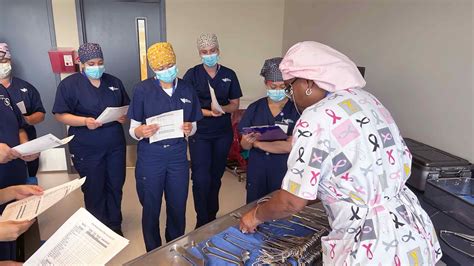The medical field is a vast and diverse industry, comprising various roles that require distinct skills, training, and expertise. Two critical professions that often get compared are Surgical Technologists (Surgical Techs) and Registered Nurses (RNs). While both professions play essential roles in the healthcare system, there are significant differences between them. In this article, we'll delve into the 5 key differences between Surgical Techs and RNs, helping you understand the unique aspects of each profession.

Education and Training
One of the most significant differences between Surgical Techs and RNs is the level of education and training required for each profession. Surgical Technologists typically need a post-secondary certificate, diploma, or associate's degree in surgical technology, which usually takes around 12-24 months to complete. In contrast, Registered Nurses require an associate's degree in nursing (ADN) or a bachelor's degree in nursing (BSN), which typically takes 2-4 years to complete. Additionally, RNs must pass the National Council Licensure Examination (NCLEX-RN) to become licensed.
Career Responsibilities
Surgical Technologists and Registered Nurses have distinct career responsibilities. Surgical Techs are responsible for preparing operating rooms, sterilizing equipment, and assisting surgeons and nurses during surgical procedures. They also help maintain asepsis, handle surgical instruments, and ensure that the operating room is well-organized. On the other hand, Registered Nurses provide hands-on patient care, administer medications, and develop individualized care plans. RNs also monitor patients' conditions, perform diagnostic tests, and educate patients about their conditions and treatment options.

Work Environment
The work environment for Surgical Techs and RNs can also differ significantly. Surgical Technologists typically work in operating rooms, surgical centers, or hospitals, where they are exposed to a fast-paced and dynamic environment. RNs, on the other hand, can work in various healthcare settings, including hospitals, clinics, nursing homes, and community health organizations. RNs may also work in specialized units, such as pediatrics, oncology, or critical care.
Salary and Job Outlook
According to the Bureau of Labor Statistics (BLS), the median annual salary for Surgical Technologists was $48,330 in May 2020. In contrast, the median annual salary for Registered Nurses was $76,840 in May 2020. The job outlook for both professions is promising, with the BLS predicting a 3% growth in employment opportunities for Surgical Techs and a 12% growth for RNs from 2020 to 2030.

Specialization and Advancement Opportunities
Another key difference between Surgical Techs and RNs is the potential for specialization and advancement opportunities. While Surgical Techs can specialize in specific areas, such as neurosurgery or orthopedic surgery, their career advancement opportunities may be limited. RNs, on the other hand, have numerous opportunities for specialization and advancement. RNs can pursue specialized certifications, such as critical care or pediatrics, and can also advance to leadership positions, such as nurse managers or directors.
Specialization Opportunities for RNs
- Critical care
- Pediatrics
- Oncology
- Orthopedic nursing
- Nurse midwifery

Conclusion
In conclusion, while both Surgical Technologists and Registered Nurses play critical roles in the healthcare system, there are significant differences between the two professions. Surgical Techs require less education and training, have distinct career responsibilities, and work in a more specialized environment. RNs, on the other hand, require more education and training, have a broader range of career responsibilities, and have more opportunities for specialization and advancement. Understanding these differences can help you make informed decisions about your career path in the medical field.
Gallery of Surgical Tech vs RN






What is the difference between a Surgical Technologist and a Registered Nurse?
+Surgical Technologists and Registered Nurses have distinct roles in the healthcare system. Surgical Technologists assist surgeons and nurses during surgical procedures, while Registered Nurses provide hands-on patient care and develop individualized care plans.
What is the education requirement for Surgical Technologists and Registered Nurses?
+Surgical Technologists typically require a post-secondary certificate, diploma, or associate's degree in surgical technology, while Registered Nurses require an associate's degree in nursing (ADN) or a bachelor's degree in nursing (BSN).
What is the job outlook for Surgical Technologists and Registered Nurses?
+The Bureau of Labor Statistics (BLS) predicts a 3% growth in employment opportunities for Surgical Technologists and a 12% growth for Registered Nurses from 2020 to 2030.
